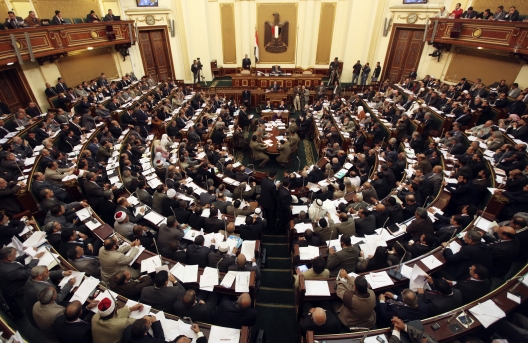 Egypt’s parliamentary elections, originally scheduled to be held in March, have been on indefinite hold since the Supreme Constitutional Court ruled two of the parliamentary elections laws unconstitutional. A committee tasked with amending the three electoral laws regulating the elections—the Parliamentary Constituencies Law, the Political Rights Law, and the Parliamentary Elections Law—was formed by Prime Minister Ibrahim Mahlab, after President Abdel-Fattah al-Sisi ordered the government to amend the electoral laws in no longer than a month.
Egypt’s parliamentary elections, originally scheduled to be held in March, have been on indefinite hold since the Supreme Constitutional Court ruled two of the parliamentary elections laws unconstitutional. A committee tasked with amending the three electoral laws regulating the elections—the Parliamentary Constituencies Law, the Political Rights Law, and the Parliamentary Elections Law—was formed by Prime Minister Ibrahim Mahlab, after President Abdel-Fattah al-Sisi ordered the government to amend the electoral laws in no longer than a month.
On April 14, Mahlab presented the final amendments to President Abdel Fattah al-Sisi for his review. One day later, Egypt’s cabinet approved the new drafts of, after which they were referred to the State Council for revision.
- What amendments did the committee make?
- How did parties react to the amendments and the cabinet’s approval?
- What was the government’s response?
What amendments did the committee make?
Parliamentary Elections Law:
The amendments increased the number of seats for individual candidates to 444 from 420, bringing the total number of seats members to 592. The number of presidential appointees increased by one to twenty-eight, while the number of party candidates remained unchanged with 120 elected via a list system.
The committee tasked with amending the laws deleted a phrase in Article 6 of the Parliamentary Elections Law that stipulated that female candidates couldn’t be dismissed from parliament unless they changed their profession or party affiliation. This was done in order to maintain equality between male and female parliamentary members.
The condition regarding banning dual citizens from running for the elections has also been amended to allow any Egyptian, capable of performing his civil and political rights to run for parliament, including dual-national Egyptians.
Parliamentary Constituencies Law:
The drafting committee lowered the number of districts from 237 to 202 for the individual seat system. District boundaries were redrawn by merging some electoral districts of new housing communities with others in the same area. Party lists will still run in just four districts.
The proportional weight for a seat is set at 161,000 voters nationwide. This figure was arrived at by dividing the total number of voters by the number of both individual and party lists seats. The difference between the maximum number of voters per district (set at 202,000 voters) and the minimum number (set at 121,000 voters), should not exceed 25 percent in order to achieve proportional representation and to minimize voter difference between districts in light of their population and size.
Geographic locations of districts were taken into consideration when deciding the number of voters per district with the exception of border governorates that are strategically located or are vital to the country’s national security.
Political Rights Law:
The committee significantly increased campaign funding limits for campaigns of electoral lists given the considerable population and size of the governorates. The Committee specified a limit of EGP2.5 million for a fifteen seat electoral list and EGP7.5 million for a forty-five seat electoral list. The law previously stipulated EGP 1 million limit for a fifteen seat electoral list and EGP3 million for forty-five seat electoral list. This amendment will consequently increase the amount of insurance money dedicated to removing campaign posters after the election is complete.
As per the recommendations of the Higher Elections Commission, election committees will be formed only in governorates that have a court of first instance, since the heads of these courts will preside over election committees. These election committees are responsible for administering and supervising the electoral process.
How did parties react to the amendments and the cabinet’s approval?
The amendments were made after Mahlab held three separate rounds of meetings with representatives from political parties, where the Prime Minister asserted that parties’ recommendations will be take into consideration. A number of party leaders were critical of the amendments and accused the committee of ignoring their recommendations. They added that the amendments only addressed the articles previously challenged by the Supreme Constitutional Court. Others however were accepting of the changes and ready to move forward to the next phase in preparing for parliamentary elections.
Tagammu Party member, Hussein Abdel Razeq criticized the committee for not considering any of their proposals when amending the laws, and called on President Abdel Fattah al-Sisi to reject the amended laws and instead form another committee comprised of political parties representatives and constitutional experts.
Reform and Development Party Chairman, Mohamed Anwar al-Sadat, said that the approved amendments are the best available option conforming to the constitution and the Supreme Court ruling. He added that any desired changes to the Constituencies Law can be made through the parliament after elections.
Nour Party Vice-President Ashraf Thabet said that although the committee did not take their proposals into account, they accepted the amendments. He added that the party is ready for the elections at any time and that their main concern is holding elections characterized by transparency, constitutionality, and state neutrality.
Wafd Party leader al-Sayyed al-Badawi also criticized Mahlab’smeetings with political parties on the electoral laws, describing them as “useless.” He also said that Egypt is witnessing an “unprecedented chaotic political scene,” and that the upcoming parliament will be the “worst in Egypt’s history.”
Socialist Popular Alliance Party acting President Medhat al-Zahed accused the cabinet of preparing the laws in advance of the talks. Al-Zahed said, “The committee tasked with amending the elections law did not consider amendments proposed by parties. Moreover, they invited [to the dialogue] some people whom we do not know or who are not politicians. Some of them called for postponing the elections.”
Socialist Popular Alliance Party Chairman, Abdel-Ghaffar Shokr, also criticized the parliamentary elections law saying it violates constitutional guarantees for equal and fair representation by giving individual candidates 80 percent of parliament seats. He said “The law opens the door for the remnants [Mubarak supporters], with their power and huge financial potential, to win the majority of parliament’s seats.”
Constitution Party Spokesperson Khaled Dawoud described the talks as a ‘comedy,’ adding that that the main aim was only to show that political parties are unable to form a consensus.
Democratic Egyptian Party Vice President, Farid Zahran, pointed to the government’s failure to engage in genuine societal dialogue. Zahran accused the government of insisting on issuing unconstitutional laws that will result in a weak parliament, which will only serve the interests of the executive authority.
Free Egyptians Party member, Mahmoud al-Alaily, said that the committee tasked with amending the electoral laws limited itself to considering only the articles previously challenged by the Supreme Court.
Conference Party Vice President, Salah Hasaballah, maintained that the amendments made by the committee were done so only to hold the elections soon in order to give the nation a long-awaited parliament.
Democratic Generation Party Assistant Chairman expressed his concern, saying “The amended laws, which were approved by the cabinet and will be sent to State Council, can be challenged and we will return to square one again.” He added, “The appointed committee didn’t review all the possibly unconstitutional articles and instead amended only the articles challenged by the Supreme Court.”
Egyptian Social Democratic Party Secretary-General, Ahmed Fawzy, said that the party discussed whether to participate in the upcoming parliamentary elections or not particularly since “the state is insisting on passing crooked election laws,” after the national dialogue which he described as a “farce,” and due to the “lack of a decent political environment for elections.”
Karama Party Chairman, Mohamed Samy, said that Democratic Current parties are still considering boycotting the elections. A final decision is expected next week after the parties consult their members.
Egyptian Front Alliance member, Nagy al-Shahaby, criticized the government and the committee tasked with amending the laws, accusing them of “wasting a month and a half only to prolong the tenure of the current government.” He added, “This is the same committee that drafted the unconstitutional laws in the first place,” and that it only abided by the Supreme Court ruling.
Democratic Civil Alliance (Egypt’s Awakening) spokesperson, Ramy Galal, said that any amendments meant to protect the next parliament and make it constitutionally stable will ensure a parliament that is in a better position to perform its duties.
What was the government’s response?
The eleven-member committee entrusted with amending the election laws said in a statement issued on April 16 that the cabinet’s approval of the newly-amended laws is in line with the government’s efforts to hold elections as soon as possible. According to the statement, the committee studied all recommendations and proposals made by political forces and approved those that either conform to the verdicts issued by the Supreme Court or those that were included in lawsuits challenging the text.
Heneidy also said that the drafters took into consideration proposals by security officials and governors, and abided by the Supreme Court’s order for fair and proportional representation. “The committee kept an article in the Parliamentary Elections Law that stipulates that 50 percent of the members appointed by the president must be women given the fact that the Constitution has several articles that call for empowering women. So the committee didn’t take into account the proposals of those saying that this privilege could be unconstitutional,” Heneidi added.
The committee, however, acknowledged that it couldn’t take other proposals into account since they are vulnerable to unconstitutionality. These proposals included combining both open and closed party lists in one system, or allowing those who didn’t observe their military service to run for parliamentary seats.
“The main goal of the community dialogue was to make use of the proposed recommendations, reach a civic consensus regarding these laws and exchange points of view—all of this has been achieved,” the committee said in its statement.
The committee also justified its decision to maintain the four electoral lists on which parties will run, saying that they were deemed constitutional by the Supreme Constitutional Court. Ali Abdel Aal, a member of the committee said that the political parties had requested an increase in the number of party lists, but added that their request was one made purely out of a desire for political gain. After reviewing the proposal, from a constitutional perspective, the committee determined that it was best to maintain the four electoral lists, he said. Abdel Aal also added that proposals set forth by parties during the national dialogue reflects their lack of awareness when it comes to the law and the constitution. Meanwhile, Heneidy said the committee should keep the four lists unchanged so that it does not further delay elections.
In a press conference on April 16, Heneidy said that the committee had presented three versions of the draft laws to the cabinet, of which the cabinet approved one. He added that Sisi had no reservations on the final drafts put to him for review. He said that the committee is now working on revising the final drafts approved by the cabinet and writing the explanatory appendix for the laws so that the drafts can be sent to both the State Council and the Higher Elections Commission next week.
Image: Photo: Egypt's parliament in 2012 (Reuters)

